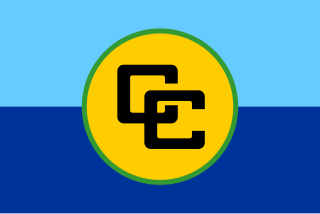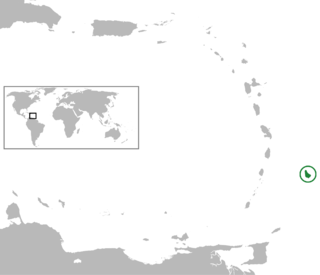Congress of Trade Unions and Staff Associations of Barbados | |
| Founded | August 1993 |
|---|---|
| Headquarters | Bridgetown |
| Location | |
Members | 20,110 (2007) |
Key people | Edwin O’Neal (President) |
The Congress of Trade Unions and Staff Associations of Barbados is a national trade union centre.
The CTUSAB has its origins in the emergence of protests against the Barbados government's acceptance of an IMF/World Bank structural adjustment programme in the early 1990s. The proposed programme included the devaluation of the Barbadian dollar, cuts to welfare, public services and public salaries, public sector job cuts, increases in taxes and privatisations. [1] In response, an umbrella organisation called the Coalition of Trade Unions and Staff Associations was formed in September 1991 by the country's two largest unions, the Barbados Workers' Union and the National Union of Public Workers. This structure was renamed the Congress of Trade Unions and Staff Associations of Barbados in August 1993 to unify the labour movement response to the worsening economic conditions of the period. [2] Joining with business groups and other civil society organisations, the CTUSAB negotiated a protocol with the government which lessened the impacts of the structural adjustment programme and decreased social conflict. [3] Business leader John Goddard termed the first protocol "remarkably successful in terms of changing the mood in the country and fostering dialogue." [4]
Affiliated unions include: the National Union of Public Workers, Barbados Workers' Union, Barbados Secondary Teachers Union, Barbados Union of Teachers, Barbados Association of Principals of Public Secondary Schools, Police Association, Prison Officers, Fire Officers Association, Barbados Registered Nurses Association and the Sugar Industry Supervisors Association.

Since the island country's independence in 1966, the economy of Barbados has been transformed from a low-income economy dependent upon sugar production into a high-income economy based on tourism and the offshore sector. Barbados went into a deep recession in the 1990s after 3 years of steady decline brought on by fundamental macroeconomic imbalances. After a painful re-adjustment process, the economy began to grow again in 1993. Growth rates have averaged between 3%–5% since then. The country's three main economic drivers are: tourism, the international business sector, and foreign direct-investment. These are supported in part by Barbados operating as a service-driven economy and an international business centre.

The Scottish Trades Union Congress (STUC) is the national trade union centre in Scotland. With 40 affiliated unions as of 2020, the STUC represents over 540,000 trade unionists.

The European Trade Union Confederation (ETUC) is the major trade union organisation representing workers at the European level. In its role as a European social partner, the ETUC works both in a consulting role with the European Commission and negotiates agreements and work programmes with European employers. It coordinates the national and sectoral policies of its affiliates on social and economic matters, particularly in the framework of the EU institutional processes, including European economic governance and the EU Semester.

The National Trades Union Congress (NTUC), also known as the Singapore National Trades Union Congress (SNTUC) internationally, is the sole national trade union centre in Singapore. NTUC is at the heart of the Labour Movement which comprises 59 affiliated trade unions, 5 affiliated trade associations, 10 social enterprises, 6 related organisations as well as a growing ecosystem of U Associates and enterprise partners. Together, it helms May Day celebrations and organises an annual rally in support of workers' solidarity and commitment to tripartite partnership. The NTUC has had a symbiotic relationship with the People's Action Party (PAP) since its inception in 1961.

The CARICOM Single Market and Economy, also known as the Caribbean Single Market and Economy (CSME), is an integrated development strategy envisioned at the 10th Meeting of the Conference of Heads of Government of the Caribbean Community (CARICOM) which took place in July 1989 in Grand Anse, Grenada. The Grand Anse Declaration had three key Features:
The Organisation of African Trade Union Unity (OATUU) is an independent regional union federation aimed at unifying trade union centres in Africa. This organisation was founded in April, 1973 as a successor to two previously competing labour union organisations in Africa: the All-African Trade Union Federation (AATUF) and the African Trade Union Confederation (ATUC). The process to unify a Pan-African labour union organisation also involved international labour organisations as decision-making stakeholders like the International Confederation of Free Trade Unions (ICFTU) and the World Federation of Trade Unions (WFTU). Finally, also with the help of the Organisation of African Unity (OAU), the AATUF and the ATUC merged to form the OATUU. The driving factors for this unification and the creation of the OATUU was to advance Pan-Africanism, economic justice, and social justice throughout African workplaces.

The Modern Records Centre (MRC) is the specialist archive service of the University of Warwick in Coventry, England, located adjacent to the Central Campus Library. It was established in October 1973 and holds the world's largest archive collection on British industrial relations, as well as archives relating to many other aspects of British social, political and economic history.

The Independent Christian Trade Unions of Slovakia (NKOS) is a trade union center in Slovakia. It has a membership of 10,000 in three affiliated unions. Independent Christian Unions of Slovakia (NKOS) are an Open Union Confederation, based on Christian principles of democracy and humanism, registered at the Ministry of Interior of the Slovak republic on 26 May 1993 by law no. 83/1990 Zb. about Association of Citizens, as amended. History of NKOS In the years 1920 -1940 Christian unions were a significant factor in the state. They were called the Slovak Christian-social trade association. Their activity was forcibly closed in 1948. After the Velvet Revolution in 1989, an effort to restore their activity emerged. In 1990 the first Christian workers' clubs were created. Then came Christian Unions of Slovakia. Christian trade unionists efforts culminated on 26 March 1993 when NKOS were registered at the Ministry of Interior, their chairman was prof. Milan Katuninec. In 1994 the first NKOS trade union, railways, was created, with the chairman Joseph Micsinai and two years later the Trade Union of Workers in Education and Science of Slovakia came into existence with its first chairman Vladimir Cinderella. In 1995, a trade union KOVO METAL was founded, its first chairman was Dušan Mihalik. In December 1994, NKOS became a member of the International Labour Organisation. They became an observer of ITUC on the Compounding Congress in Vienna in 2006.

The following is an alphabetical list of topics related to the nation of Barbados.

The European Metalworkers' Federation (EMF), founded in 1971, is a federation of 68 metalworkers' unions from 31 countries, representing a combined total of 6.5 million affiliates. It is based in Brussels, Belgium, the general secretary is Ulrich Eckelman and Bart Samyn is the Deputy General Secretary. The organisation was dissolved on 15 May 2012, to become a part - together with EMCEF and ETUF-TCL - of the newly created organisation industriAll European Trade Union on 16 May 2012
The organizations listed below constitute the Canadian Labour Congress, the national federation of trade unions:

Tasneem Essop, is currently (2009) the Executive Director of Climate Action Network, the largest global network of over 1,300 civil society organisations, in over 120 countries, fighting the climate crisis. Essop served as a former Provincial Minister of Environment, Planning and Economic Development in the Western Cape and was responsible for the Department of Environmental Affairs and Development Planning (DEADP) and the Department of Economic Development, as well as the Western Cape Investment and Trade Promotion Agency, Wesgro and the Western Cape Nature Conservation Board, CapeNature.
The Global Labour University (GLU) is an international network of universities, trade unions, NGOs and the International Labour Organisation. It was initiated in 2002 and offers master's programs, academic certificate programs and Massive Open Online Courses (MOOC) on sustainable development, social justice, international labour standards and trade/labour unions, economic policies and global institutions.

The Irish Congress of Trade Unions, formed in 1959 by the merger of the Irish Trades Union Congress and the Congress of Irish Unions, is a national trade union centre, the umbrella organisation to which trade unions in both the Republic of Ireland and Northern Ireland affiliate.

The Trades Union Congress (TUC) is a national trade union centre, a federation of trade unions in England and Wales, representing the majority of trade unions. There are 48 affiliated unions, with a total of about 5.5 million members. Frances O'Grady became General Secretary in 2013 and presented her resignation in 2022, with Paul Nowak becoming the next General Secretary in January 2023.
The term Non State Actors (NSAs) is used as a substitute for the term Civil Society within the scope of the Cotonou Partnership Agreement (CPA), an international trading agreement between the ACP Group of States and the European Union (EU), signed in the year 2000 and valid until 2020. Up until 2007, the NSAs were virtually shut out of the CPA in the seventy nine ACP States and hence the concept of the NSA Panel came out of studying the technical aspects of the CPA to see how best the NSA could participate in Development Cooperation. The Non State Actors Advisory Panel or NSA Panel is an example of how NSAs or civil society can benefit and participate in national development within the CPA in the seventy-nine ACP States. Seven Panels were created in Barbados and the Organisation of Eastern Caribbean States (OECS) to launch this initiative.
Sir Cardinal LeRoy Trotman, KA is a Barbadian trade unionist and politician.